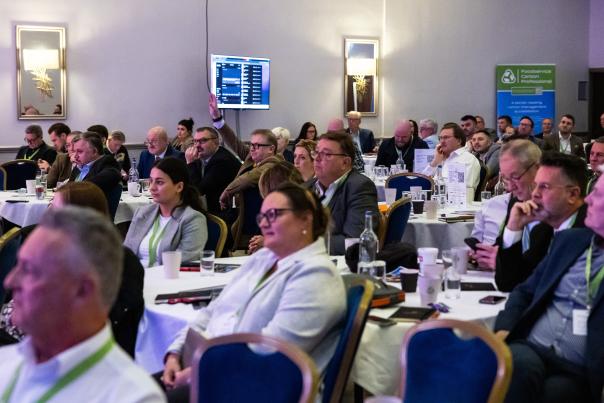
A thought-provoking, insightful and stimulating FEA industry conference was kicked off on November 20 at the Leonardo Hotel, Hinckley Island by facilitator Simon Stenning of Future Foodservice.
And he pulled no punches with his forecast for the next two years – they’re going to be tough, though the foodservice sector will grow, slowly.
He said that consumer behaviour had changed, with less frequent and more specialised eating out occasions.
“The rise of alternative venues, such as market halls, juice bars and competitive socialising (axe throwing, et al) is hurting traditional, middle ground operators.
“Having said that, fast food is growing, especially in the quality end of the sector, with established brands like Five Guys and new ones like Dave’s Hot Chicken.
“The terms ‘friction free’ and ‘the pleasure principle’ are part of the future for hospitality. Friction-free means no barriers and, sometimes, no staff - Gen Z don’t like interacting with waiters.
He concluded: “Expect digital kiosks, self-service sites and vending. Paradoxically ‘the pleasure principle’ is all about luxury experiences in beautiful surroundings, with operators like Maya and House of Gods.”
Net Zero
Then Pierre-Yves Paslier, co-chief executive of Notpla, gave a fascinating insight into using seaweed to create plastic alternatives.
The company won the Earthshot Prize and is already supplying foodservice products such as seaweed-based linings for cardboard takeaway boxes.
And Tim Radcliffe, net zero programme manager at the NHS, followed up by outlining the multifaceted challenges in the move towards net zero.
He said the NHS delivered 191m meals a year and food waste was a huge issue. He also called for energy-efficient equipment that was durable, repairable and recyclable.
Meanwhile, Oliver Rosevear, director of sustainability at Fuller’s, discussed the company’s aim to have zero greenhouse gas emissions by 2030.
Key areas include recycling, energy efficiency, transport and heating – a big problem with Fuller’s older properties.
He said the move to all-electric kitchens, using technology such as induction, was giving payback within five years.
Next up was hospitality energy savings expert Dr Sam Mudie, who chaired the sustainability panel. As foodservice kitchens account for around 8% of the UK’s whole carbon footprint, changing behaviour can make a huge difference.
She cited an example of monitoring an electric grill: following best practice resulted in a saving of £3,000 a year in energy. The panellists gave their top advice for SME foodservice operators: measure energy costs; don’t over specify equipment; and train staff to follow best practice.
As for what they’d like to see in the future, Tim Radcliffe wanted scales installed where food waste is scraped, to measure it. Ollie Rosevear went for equipment that was easy for chefs to use and adapt to, and Pierre-Yves wanted more equipment that could handle and process food waste on site.
The AI Session
People using artificial intelligence (AI) are, on average, 40% more effective, says Peter Russell FIH, chief technology officer at the Russell Partnership.
In foodservice, AI could be used in many ways, from predictive maintenance to nutritional analysis, he said. Meanwhile, Scott Duncan CFSP, managing director of Unox, described the use of AI in cooking and developing new technologies.
Douglas MacLachlan, technical director of Falcon, talked about the company’s new system for reducing food waste in the health service.
And then James Taylor CFSP, carbon reduction specialist at the Zero Carbon Company, put a ‘carbon lens’ on the issue, suggesting AI could be used to look into questions like ‘which is your most carbon intense recipe?’.
Panel host Spencer Kelly, presenter of BBC TV’s Click, asked if customers wanted AI solutions?
He added: “The answer is ‘no’, they just want solutions. One issue with AI is that, while it can help us become sustainable, it also has a massive carbon footprint – currently its emissions are the same size as aviation.
He then gave what new FEA chair Emma Brooks described as an engaging, uplifting and hilarious keynote address, covering everything from ‘fugglers’ to killer robots and jelly fish smoothies.
Meanwhile, Emma had her moment in the spotlight when she welcomed delegates and gave some insights into her background and plans for the FEA when she was interviewed by Radford Chancellor for the Kitchen Curiosity podcast.
As managing director of Quintex Emma has a major focus on sustainability. She’s FEA’s first female chair and welcomed the number of women taking up important roles at the association.
And finally, John Cunningham CFSP, chief executive of the FEA, gave an update on the association’s Foodservice Carbon Professional (FCP) training, with the first graduates being awarded their certificates at Conference.
The course is delivered entirely online, alongside the core module candidates complete a subject-specific module on cooking and warming, refrigeration or warewashing.
Conference award winners 2024
The Outstanding Contribution to the Foodservice Industry Award went to Malcom Harling CFSP of Williams Refrigeration. A hugely popular figure, he received no fewer than three standing ovations during the ceremony at the Conference Gala Dinner.
The Charitable Endeavour Awards celebrate the industry’s achievements in raising funds for good causes. The Company winner was Unox; the Team category was won by Lockhart; Marc Sumner won the Group category; and the Individual category winner was Andy Kershaw.
The Apprentice of the Year Award went to Tyler Speight from Advance Group, who was presented with it by industry legend John Gilbert. Runners-up were Thomas Hamid of Airedale Group and James Rainey from Falcon Foodservice Equipment.
The FEA Chair Awards are given to those whose service has enhanced the foodservice industry. This year’s winners were Simon Frost CFSP, Kirstin Hatherley, Stephen Hobbs CFSP, Erik Mull, Malcolm Skinner CFSP, and the FEA’s patron, Lord Trefgarne.